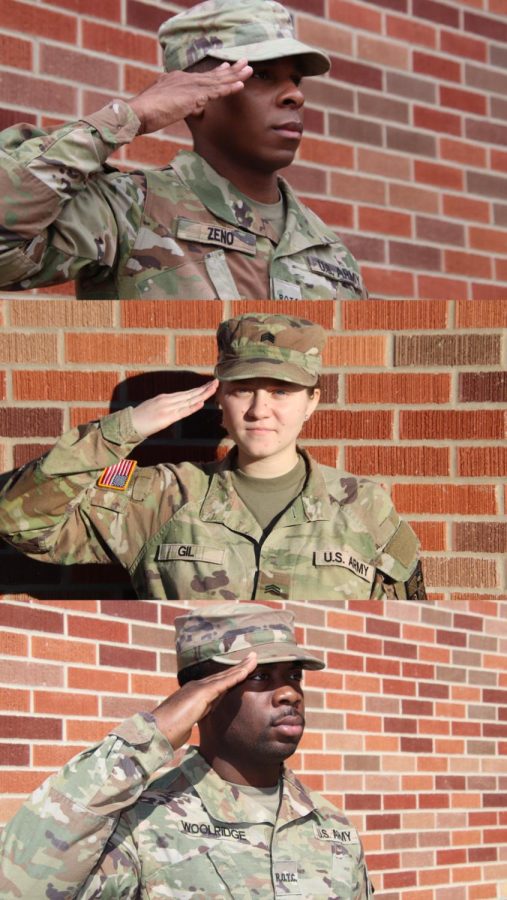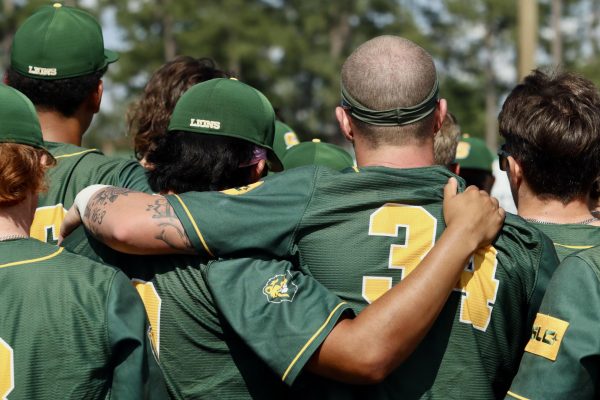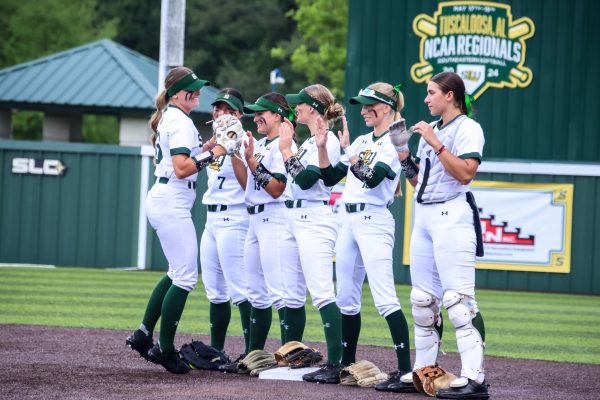ROTC: People, students, soldiers
Cadets (from top to bottom) Daniel Zeno, Leah Gil and and Tyren Woolridge saluting.
The Reserve Officers’ Training Corps (ROTC) trains college graduates for careers in the military, and cadets graduate from Southeastern’s ROTC program as Army officers. Although those in ROTC are recognized by their uniforms on campus, many students know little about the life of a cadet.
Through discipline and leadership, ROTC has the ability to bring people together, yet each cadet is unique. They have different majors and interests, and each one has their own reasons for joining ROTC.
Sophomore Leah Gil is majoring in communication science and disorders, but said she always wanted to join the military. She did not know which branch would be the best fit for her, but knew she wanted to come to Southeastern for college. One day, she found herself talking with people from the ROTC program.
“I went to ROTC before I even joined the army just to see if it was for me and I fell in love with the program,” Gil said.
After her first semester, Gil decided to take a semester off to enlist in the Army. During her semester off, she completed basic training at Fort Leonard Wood Missouri and then attended job training at Fort Jackson, S.C. In Fall 2022, Gil returned to Southeastern and joined SLU’s ROTC.
Gil used ROTC to help her find which branch of the military best suited her, but others joined for different reasons.
Daniel Zeno is a junior art major at Southeastern. Zeno said he didn’t think he would join ROTC, but is happy that he did as it helped refine his leadership skills.
“Leadership is an important part of ROTC,” Zeno explained. “You’re learning about the military as a whole and how it operates. Then you’re learning how to lead missions, raids, projects and other things.”
The longer a person is in the ROTC program, the more tasks and leadership responsibilities fall upon them.
Zeno said he is excited to become an African American officer in the United States military.
A sophomore industrial engineering major, Tyren Woolridge, joined to better himself personally.
Woolridge didn’t think that he would join the program either, but he wanted to minimize negative distractions and secure the future he wanted to create for himself.
“I want to leave the ROTC as an officer, as a better man and with a better mentality,” Woolridge said.
Gil, Zeno and Woolridge received different benefits from joining the ROTC because they joined for different reasons. However, some benefits of joining ROTC are given to all participants. Joining and contracting with ROTC provides students with financial aid, helps with academics, fitness goals, building leadership skills and securing a future career.
There are many positives that can be gained by joining ROTC, but it is filled with hardwork and discipline.
Students are expected to wake up at 0500, i.e. 5 a.m., to get to physical training at 5:45 a.m. on Mondays, Wednesdays and Fridays. Training usually lasts for about an hour. ROTC students also attend a class where they learn skills and objectives used in leadership and the military.
Although there is a lot of work and discipline involved in being part of the military, there are also fun moments and memories.
For Zeno and Woolridge, their memories often involve being around each other and making others laugh. Gil enjoys the friendly competition on physical training days and moments spent around Zeno and Woolridge.
Gil, Zeno and Woolridge encourage anyone who is interested in joining ROTC to do it.
“We’re still looking for more qualified candidates to join the program,” Zeno added.
ROTC opens their doors to anyone who is interested in joining the program or looking to inquire about it. Students are allowed to take the class without fully committing to the program to see if it’s for them. Gil elaborated that the program size doubled this semester.
“Don’t let anyone discourage you,” Woolridge said. “See where you’re at in life and see what the possibilities of being an officer can take you.”
Your donation will support The Lion's Roar student journalists at Southeastern Louisiana University.
In addition, your contribution will allow us to cover our annual website hosting costs.
No gift is too small.

Samantha Sims is a strategic communication major with an anticipated graduation of Fall 2025. She is from Gretna and joined The Lion’s Roar staff in...






